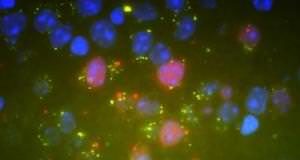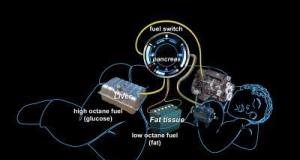Finnish Twin Study Yields New Information On How Fat Cells Cope...
The mechanisms by which obesity leads towards metabolic co-morbidities, such as diabetes mellitus, are poorly understood and of great public health interest. A study led by Matej Orešič from VTT Technical Research Centre of Finland suggests that adaptation of fat cell membranes to obesity may play a key role in the early stages of inflammatory disorders.
Insulin Action In The Brain Can Lead To Obesity: How Insulin...
Fat-rich food makes you fat. Behind this simple equation lie complex signalling pathways, through which the neurotransmitters in the brain control the body's energy balance. Scientists at the Cologne-based Max Planck Institute for Neurological Research and the Cluster of Excellence in Cellular Stress Responses in Ageing-associated Diseases (CECAD) at the University of Cologne have clarified an important step in this complex control circuit.
Yo-Yo Dieting Vs. Obesity? Dieters May Be Healthier, Live Longer, Mouse...
Yo-yo dieters may be healthier and live longer than those who stay obese, a new Ohio University study in mice suggests. Mice that switched between a high-fat and low-fat diet every four weeks during their approximate two-year lifespan lived about 25 percent longer and had better blood glucose levels than obese animals that ate a high-fat diet. The yo-yo dieters also lived about as long as a control group of mice steadily fed a low-fat diet.
Obesity Greater Risk for Fatty Liver Than Moderate Amounts of Alcohol,...
Being overweight and resistant to insulin constitute a greater risk for fatty liver than was previously thought, according to a study from Linköping University in Sweden that is now being published in the journal Annals of Medicine.
Evolutionary Conservation Of Fat Metabolism Pathways
By virtue of having survived, all animals-from flies to man-share a common expertise. All can distinguish times of plenty from famine and adjust their metabolism or behavior accordingly. Failure to do so signals either extinction or disease.
‘Bad’ Cholesterol Not As Bad as People Think, Study Shows
The so-called "bad cholesterol" -- low-density lipoprotein commonly called LDL -- may not be so bad after all, shows a Texas A&M University study that casts new light on the cholesterol debate, particularly among adults who exercise.
System In Brain — Target Of Class Of Diabetes Drugs —...
University of Cincinnati (UC) researchers have determined why a certain class of diabetes drugs leads to weight gain and have found that the molecular system involved (PPAR-γ found in the brain) is also triggered by consumption of high-fat foods.
Low Carbohydrate Diet May Reverse Kidney Failure In People With Diabetes
Researchers from Mount Sinai School of Medicine have for the first time determined that the ketogenic diet, a specialized high-fat, low carbohydrate diet, may reverse impaired kidney function in people with Type 1 and Type 2 diabetes.
Limiting Carbs, Not Calories, Reduces Liver Fat Faster, Researchers Find
Curbing carbohydrates is more effective than cutting calories for individuals who want to quickly reduce the amount of fat in their liver, report UT Southwestern Medical Center researchers.
Moderate Exercise Dramatically Improves Brain Blood Flow In Elderly Women
Research conducted at Texas Health Presbyterian Hospital's Institute for Exercise and Environmental Medicine in Dallas suggests that it's never too late for women to reap the benefits of moderate aerobic exercise. In a 3-month study of 16 women age 60 and older, brisk walking for 30-50 minutes three or four times per week improved blood flow through to the brain as much as 15%.
Blueberries May Inhibit Development Of Fat Cells
The benefits of blueberry consumption have been demonstrated in several nutrition studies, more specifically the cardio-protective benefits derived from their high polyphenol content. Blueberries have shown potential to have a positive effect on everything from aging to metabolic syndrome. Recently, a researcher from Texas Woman's University (TWU) in Denton, TX, examined whether blueberries could play a role in reducing one of the world's greatest health challenges: obesity.
‘Dual Switch’ Regulates Fat Formation: Discovery Points To New Obesity And...
New research by scientists at The Scripps Research Institute and collaborating institutions has identified a key regulator of fat cell development that may provide a target for obesity and diabetes drugs.















